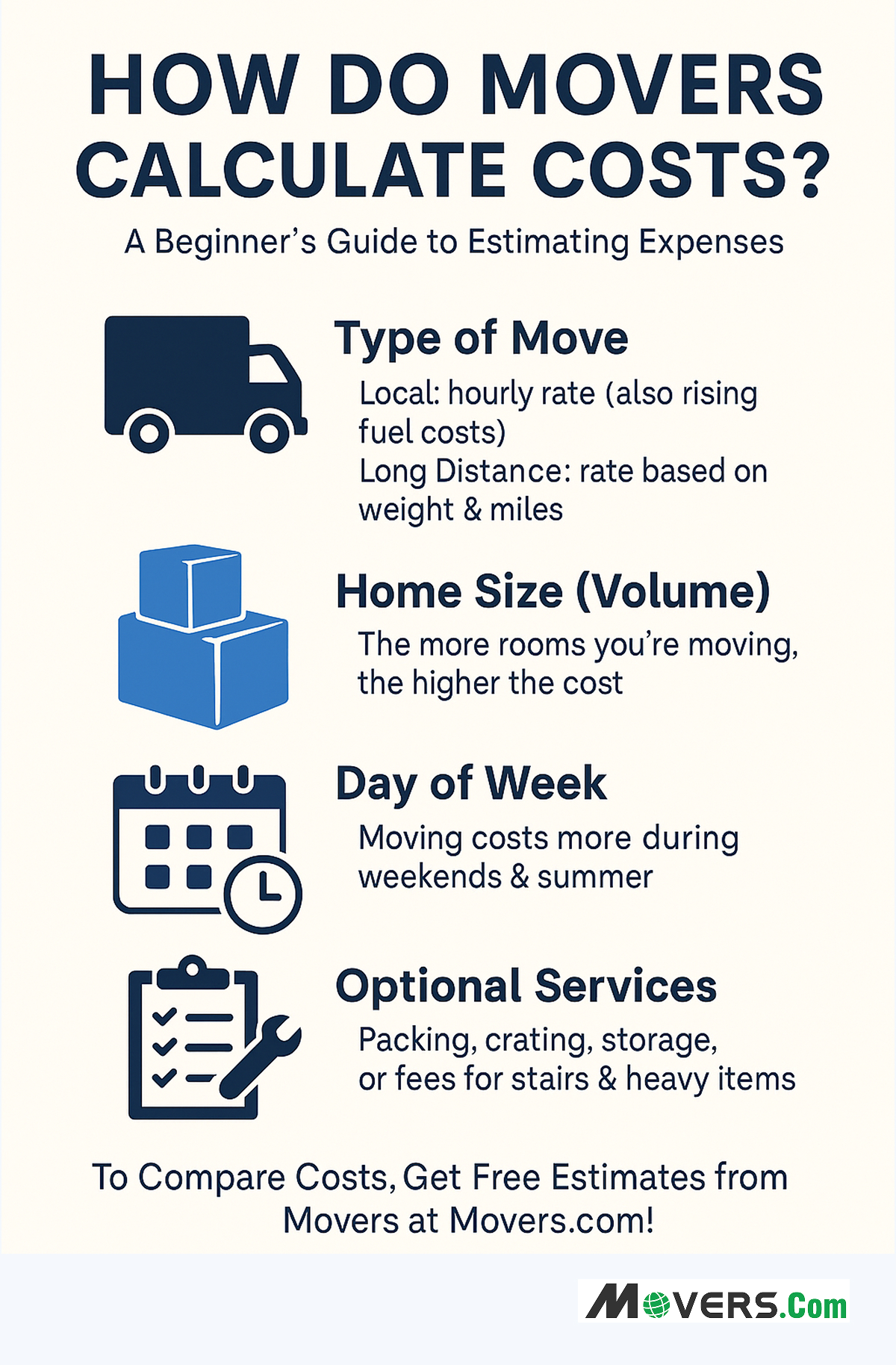Ever wonder how moving companies determine the price of your move?
Moving costs vary depending on several factors, including the type of move, the volume of your shipment, the services you require, and the company you choose.
If you're planning an upcoming move, find out how a potential moving company costs will help calculate your relocation budget.
In this guide, we’ll know how moving companies calculate the cost of a move.
How are Local Moves Calculated?
If your relocation is local, movers generally charge per hour for the duration of the move.
Rates vary by company, but the average rate across the country is $25 to $50 per mover, per hour.
You will require one more mover than you have rooms.
For example, a one-bedroom apartment will cost $100 an hour for a two-man moving crew.
How are Long Distance Moves Calculated?
If you are moving long-distance (more than 100 miles), you will need the services of long-distance movers.
Long-distance moves are calculated based on the weight of your belongings and the distance transported.
Every moving company is different, but you will likely be charged a rate per pound and a rate per mile.
Prices vary, but the average rate across the country for a long-distance move is 50 cents per pound and around 75 cents per mile.
The mileage rate usually decreases the farther you will travel.
TIP: When booking a long-distance move, it's important to receive an in-home estimate. A moving specialist can assess and provide you with an accurate quote that includes extra fees like fuel and tolls.
How are Auto Moves Calculated?
On average, shipping a four-door sedan in an open-air trailer costs $1 per mile for any trip under 500 miles.
The mileage rate decreases for longer distances.
For example, it will cost 75 cents per mile for trips above 500 miles and 50 cents per mile for trips above 2,000 miles.
Reasons why auto transport will cost more:
- Heavy vehicle, such as pick-up truck or SUV
Be Wary of Extra Fees
When movers provide an estimate, they may not mention the various extra fees you will incur come moving day.
When you receive your in-home assessment, be clear and precise about the services you will need and ask detailed questions about any extra fees that may be charged.
Some common services or extras that will require additional costs include:
- Packing services: If you need your items packed by the movers, this service will cost extra.
If you are moving locally, the time it takes to pack will be included in your hourly rate.
- Packing materials: Packing materials are not included in your estimate-moving companies often charge extra for boxes, shrink wrap, bubble wrap, furniture blankets and tape.
- Blanket-wrapping: Even if you pack your own goods, you will want to protect your furniture from scratches, chips, dents, dirt and debris.
Movers will wrap your furniture carefully with durable blankets - but may charge extra for the service.
- Furniture assembly/disassembly: If you need your entertainment center or bed set taken apart or reassembled after your move, ask your moving company if there are additional fees for this service.
- Stair carries: Stairs can add considerable fees to your moving cost.
If you have stairs in your home, movers may charge an extra fee per-step, per-flight or per-turn depending on the object they're moving.
- Long carries: Have an acre of property or an extra-long driveway? If the movers need to move your belongings over certain distances, your cost may go up.
Some companies may even charge for every step the movers take.
- Shuttle services: If there is a lack of imminent parking near your home, the movers may have to park the truck a distance away and transport your items via shuttle.
- Storage: If you are unable to receive delivery of your items right away and require storage, you will pay extra for this service - usually calculated as a monthly rate.
- Insurance: Insurance is crucial to protect your items in case of damage or loss.
The standard insurance provided by movers is known as Released Value Protection and covers at a rate of no more than 60 cents per pound.
Ask the company about their additional coverage plans and associated costs to ensure your belongings are protected.
- Moving specialty items: If you have an item that requires special procedures or equipment to transport—such as antiques, safes, pianos, or artwork—you may receive an extra charge.
Be sure to ask any potential mover about their experience moving these items before scheduling.
Always ask your mover what type of estimates they provide, and request an in-home estimate instead an over-the-phone estimate.
You should also get your estimate in writing, to ensure you don’t become victim to a common moving scam.
Takeaway
- Moving costs depend on distance, weight, and services needed
- Local moves are usually charged by the hour
- Long-distance moves are based on weight and mileage
- Extra services can increase your total cost
- In-home estimates help avoid unexpected charges
Note
Always ask for a written, in-home estimate and review all potential extra fees before booking.
Clear communication with your mover helps protect your budget and prevents surprises on moving day.
Bottom Line
For personalized help with your move, talk to our moving specialist today.
Get a free moving quote and compare trusted movers in your area.
For expert tips and guidance for moving, explore our detailed moving guides.
